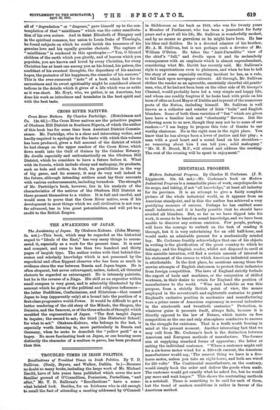Modern Industrial Progress. By Charles H. Cochrane. (J. B. Lippincott.
10s. 6d. net.)—Mr. Cochrane's book on Modern Industrial Progress is a remarkable piece of work, encyclopaedic in its scope, and taking, if not "all knowledge," at least all industry for its province. It is an attempt to give a fairly complete picture of the whole industrial world, as it appears from an American standpoint, and in this the author has achieved a very gratifying measure of success. Perhaps he has omitted some small industries, and it is hardly possible that he should have avoided all blunders. But, so far as wo have dipped into his work, it seems to be based on sound knowledge, and we have been unable to discover any serious omission. Few people, perhaps, will have the courage to embark on the task of reading it through, but it is very entertaining for an odd half-hour, and would make an admirable present for a mechanically minded boy. Mr. Cochrane frankly acknowledges that one of his objects in writing is the glorification of the groat country to which he belongs ; and the English reader, whilst not disposed to cavil at this amiable intention, will find a certain amount of interest in his statement of the causes to which American industrial success is attributable. In the first place, he mentions among these the unwise attempts of English statesmen to protect their industries from foreign competition. The laws of England strictly forbade the export of tools and machines, or the emigration of skilled workmen, in their desire to retain for England the position of manufacturer to the world. "Wise and laudable as was this purpose, from a strictly British point of view, the means employed in the seventeenth and eighteenth centuries to guard England's exclusive position in mechanics and manufacturing were a prime cause of American supremacy in several industries in the nineteenth and twentieth centuries." Protection, in whatever guise it presents itself, always fails, because it is directly opposed to the law of Nature, which insists on free competition as the one and only atmosphere conducive to success in the struggle for existence. That is a truth worth bearing in mind at the present moment. Another interesting fact that we may cull from Mr. Cochrane's book is the distinction between American and European methods of manufacture. The former aim at supplying standard forms of apparatus ; the latter at suiting the individual customer. "Where a customer might call for a six-horse motor wired for a 250-volt current, the American manufacturer would say, 'The nearest thing we have is a five- horse motor, unless you take an eight-horse, and both are wired for 220 volts.' The Continental manufacturer, on the contrary, .would simply book the order and deliver the goods when made. The customer would get exactly what he asked for, but he would pay more and wait longer." This shows the contrasting methods in a nutshell. There is something to be said for each of them, but the trend of modern conditions is rather in favour of the American method.


















































 Previous page
Previous page